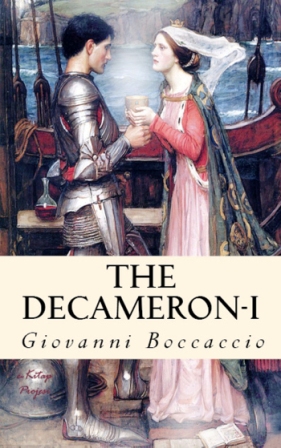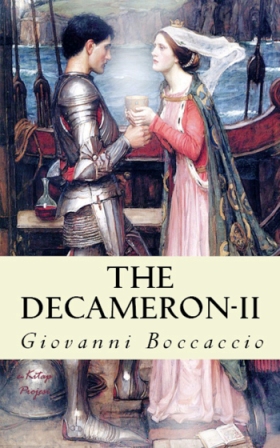More Search Results...
Giovanni Boccaccio (1313 –1375) was an Italian writer, poet, correspondent of Petrarch, and an important Renaissance humanist. Boccaccio wrote a number of notable works, including The Decameron and On Famous Women. As a poet who wrote in the Italian vernacular, Boccaccio is particularly noted for his realistic dialogue, which differed from that of his contemporaries, medieval writers who usually followed formulaic models for character and plot.
Short Biography:
The details of Boccaccio’s birth are uncertain. He was born in Florence or in a village near Certaldo where his family was from. He was the son of aFlorentine merchant, Boccaccino di Chellino, and an unknown woman; he was likely born out of wedlock. Boccaccio’s stepmother was called Margherita de’ Mardoli.
Early life
Boccaccio grew up in Florence. His father worked for the Compagnia dei Bardi and in the 1320s married Margherita dei Mardoli, who was of a well-to-do family. Boccaccio may have been tutored by Giovanni Mazzuoli and received from him an early introduction to the works of Dante. In 1326, when his father was appointed head of a bank, Boccaccio moved with his family to Naples. Boccaccio was an apprentice at the bank but disliked the banking profession. He persuaded his father to let him study law at the Studium, where for the next six years he studied canon law. He also pursued his interest in scientific and literary studies.
His father introduced him to the Neapolitan nobility and the French-influenced court of Robert the Wise (the king of Naples) in the 1330s. At this time he fell in love with a married daughter of the king, who is portrayed as “Fiammetta” in many of Boccaccio’s prose romances, including Il Filocolo (1338). Boccaccio became a friend of fellow Florentine Niccolò Acciaioli, and benefited from his influence as the administrator, and perhaps the lover, of Catherine of Valois-Courtenay, widow of Philip I of Taranto. Acciaioli later became counselor to Queen Joan I of Naples and, eventually, her Grand Seneschal.
It seems Boccaccio enjoyed law no more than banking, but his studies allowed him the opportunity to study widely and make good contacts with fellow scholars. His early influences included Paolo da Perugia (a curator and author of a collection of myths, the Collectiones), the humanists Barbato da Sulmona and Giovanni Barrili, and the theologian Dionigi di Borgo San Sepolcro.
The Decameron (Volume I)
Son of a merchant, Boccaccio di Chellino di Buonaiuto, of Certaldo in Val d'Elsa, a little town about midway between Empoli and Siena, but within the Florentine "contado," Gio-vanni Boccaccio was born, most probably at Paris, in the year 1313. His mother, at any rate, was a Frenchwoman, whom his father seduced during a sojourn at Paris, and afterwards deserted. So much as this Boccaccio has himself told us, under a transparent veil of allegory, in his Ameto. Of his mother we would fain know more, for his wit has in it a quality, especially noticeable in the Tenth Novel of the Sixth Day of the Decameron, which marks him out as the forerunner of Rabelais, and prompts us to ask how much more his genius may have owed to his French ancestry. His father was of sufficient standing in Florence to be chosen Prior in 1321; but this brief term of office—but two months—was his last, as well as his first experience of public life. Of Boccaccio's early years we know nothing more than that his first preceptor was the Florentine grammarian, Giovanni da Strada, father of the poet Zanobi da Strada, and that, when he was about ten years old, he was bound apprentice to a merchant, with whom he spent the next six years at Paris, whence he returned to Florence with an inveterate repugnance to commerce.
More info →The Decameron: (Volume II)
In this Volume-two, ”Endeth here the fourth day of the Decameron, beginneth the fifth, in which under the rule of Fiammetta discourse is had of good fortune befalling lovers after divers direful or disastrous adventures. ”
All the east was white, nor any part of our hemisphere unillumined by the rising beams, when the carolling of the birds that in gay chorus saluted the dawn among the boughs induced Fiammetta to rise and rouse the other ladies and the three gallants; with whom adown the hill and about the dewy meads of the broad champaign she sauntered, talking gaily of divers matters, until the sun had attained some height.
More info →

































